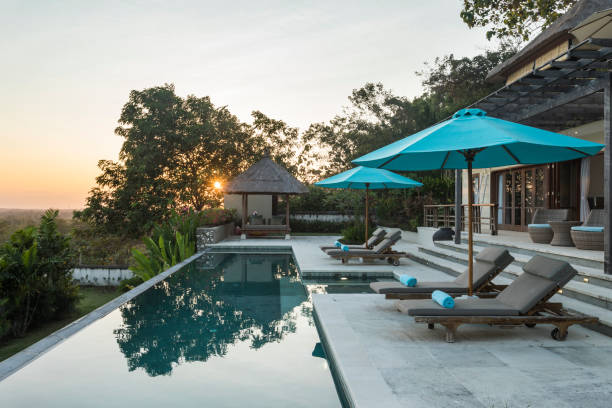How to Apply for a PBG Permit in Bali – Complete 2025 Guide for Legal Building Approval



If you’re planning to build, renovate, or modify a property in Bali, securing a PBG permit is a legal requirement. Formerly known as the IMB (Izin Mendirikan Bangunan), the PBG (Persetujuan Bangunan Gedung) permit is the current mandatory document for any type of construction activity. Whether you’re a private individual, a real estate investor, or a business owner, understanding the correct process to apply for a PBG permit in Bali is critical for ensuring your project moves forward smoothly and legally.
In this detailed guide, The Bali Lawyer explains the entire PBG application process in Bali for 2025, including requirements, procedures, expected timelines, and how we can support you from start to finish.
What is a PBG Permit?
A PBG permit is an official building approval granted by the local government that confirms your construction complies with spatial planning, safety, and technical standards. Introduced under the new Indonesian Building Law, the PBG replaces the older IMB system and must be obtained before any physical construction begins on a site.
Whether you’re constructing a villa, a resort, a commercial building, or even a simple residence, obtaining a PBG permit ensures your development is recognized, legal, and eligible for utility connections and future property transactions.
Why You Need a PBG Permit in Bali
In Bali, local authorities strictly enforce building regulations to protect the environment, cultural zones, and zoning laws. Proceeding with construction without a valid PBG permit can result in:
Government fines
Legal disputes with neighbors or authorities
Temporary or permanent suspension of construction
Demolition orders
Ineligibility for utilities like electricity and water
Issues in selling or leasing your property
A valid PBG permit secures your investment, guarantees regulatory compliance, and prevents future complications. It also builds trust with potential buyers, tenants, or investors.
Who Can Apply for a PBG Permit?
Both Indonesian citizens and foreign nationals can apply for a PBG permit, provided they have legal rights to the land and an appropriate ownership structure. Foreigners typically apply under:
Hak Pakai (Right to Use) for residential use
PT PMA (Foreign-Owned Company) for commercial or rental use
The Bali Lawyer assists both local and international clients in preparing all required documents and ensuring full legal compliance during the application process.
Requirements for a PBG Permit in Bali
Before submitting an application, certain documents and approvals must be prepared. The specific requirements may vary depending on the type, size, and location of the property, but generally include:
Legal Documents
Proof of land ownership or land use rights
Land certificate (Sertifikat Tanah)
Land zoning information (RDTR or RTRW)
Identity documents (KTP for locals, passport and KITAS for foreigners)
Technical Documents
Architectural and structural drawings signed by certified professionals
Site plan and building layout
Building specifications (height, materials, foundation, etc.)
Utility connection plan (electricity, plumbing, waste)
Additional Documents (if required)
Environmental documents (UKL/UPL or AMDAL) for larger projects
Fire safety drawings
Neighbor consent (if property borders public or sensitive land)
Step-by-Step Guide: How to Apply for a PBG Permit in Bali
The PBG application involves coordination with multiple parties, including architects, engineers, legal consultants, and local authorities. Here’s a step-by-step breakdown of the typical process:
Step 1: Legal and Zoning Review
Before starting any construction plans, it’s essential to confirm your land is legally buildable and that your project complies with local zoning regulations. This step includes reviewing the land certificate and zoning map.
The Bali Lawyer provides legal due diligence to confirm your property’s eligibility for development.
Step 2: Prepare Technical Drawings
Next, you’ll need to hire a certified architect and structural engineer to prepare technical drawings. These must include:
Floor plans
Building elevations
Foundation design
Drainage system
Fire escape plans (if required)
Structural calculations for safety compliance
These documents must comply with Indonesia’s national building codes.
Step 3: Submit Online Application
Since 2021, most PBG applications must be submitted through the Online Single Submission (OSS) system. The applicant must upload all technical and legal documents for review by the local government.
The Bali Lawyer can assist with OSS registration, document submission, and follow-ups with the relevant agencies.
Step 4: Technical Review by Authorities
Once submitted, the building plans are reviewed by a technical team in the local government’s public works or spatial planning department. They assess:
Structural safety
Architectural compliance
Environmental impact
Alignment with zoning regulations
The time frame for this review varies based on building type and complexity.
Step 5: Site Inspection (If Required)
For certain properties or larger developments, a site inspection may be carried out by government officials to verify the land and ensure the submitted plans match the physical conditions.
Step 6: Issuance of PBG Permit
If your application is approved, the PBG permit is issued digitally or physically. This document officially allows construction to begin and must be displayed at the construction site.
From this point forward, your project is legally recognized, and you can begin to coordinate with contractors and utility companies.
How Long Does It Take to Get a PBG Permit in Bali?
The timeline to obtain a PBG permit depends on the type and size of the project:
Simple residential buildings: 4 to 8 weeks
Mid-size villas or commercial properties: 8 to 12 weeks
Large-scale developments (resorts, apartments): 3 to 6 months
Delays may occur due to incomplete documents, government backlogs, or the need for environmental clearance. Using a professional legal team like The Bali Lawyer significantly shortens the waiting period by ensuring all documents are correct and submitted on time.
Common Mistakes to Avoid in PBG Applications
Applying for a PBG permit may seem straightforward, but many applicants encounter obstacles due to small errors. Avoid these common issues:
Submitting outdated land certificates
Using unlicensed architects or engineers
Ignoring local cultural restrictions (especially in sacred zones)
Missing zoning checks
Failing to prepare required environmental documents
Submitting documents not written in Bahasa Indonesia
Working with The Bali Lawyer ensures all legal, cultural, and administrative standards are met, protecting your investment and keeping your project on track.
Cost of Applying for a PBG Permit in Bali
The cost to apply for a PBG permit varies based on several factors:
Type of building (residential, commercial, hospitality)
Building size and complexity
Location (different regencies have different fees)
Required documentation and consultant involvement
General cost estimates range from IDR 15,000,000 to over IDR 100,000,000. This includes legal consultation, document preparation, technical drawings, and government submission fees.
We offer transparent, fixed-rate packages to help you budget accurately for your project.
Why Work With The Bali Lawyer?
Applying for a PBG permit involves legal compliance, technical expertise, and government coordination. The Bali Lawyer is a licensed legal consultancy based in Bali, specializing in property law and permit processing.
When you work with us, you benefit from:
Legal due diligence on land and ownership
Coordination with certified architects and engineers
Fast-tracked PBG submissions via OSS
Regular updates and status tracking
Solutions for foreigners and foreign-owned companies (PT PMA)
Full compliance with Bali’s local and national regulations
Whether you’re planning to build your dream villa, open a rental business, or start a commercial development, our expert team handles the process from start to finish—efficiently, legally, and professionally.
Additional Permits You May Need After the PBG
Once the PBG permit is issued, you may need additional documentation to operate or finalize your property:
SLF (Sertifikat Laik Fungsi): Confirms the building is suitable for occupancy
NIB (Business Identification Number): Required for commercial properties
Environmental licenses: For large or sensitive developments
Tax registration and utility setup
The Bali Lawyer provides bundled services to ensure your building project is fully permitted and ready for operation or sale.
Start Your PBG Application with Confidence
Obtaining a PBG permit is the most important legal step before construction in Bali. It protects your property investment, ensures safety, and prevents legal problems in the future.
Instead of navigating the process alone, trust the experienced legal professionals at The Bali Lawyer to manage every step—accurately, quickly, and fully in line with Indonesian regulations.
CONTACT THE BALI LAWYER TODAY TO ISSUE YOUR BUILDING PERMITS AND CONSTRUCTION CERTIFICATES – FAST, LEGALLY, AND HASSLE-FREE!
